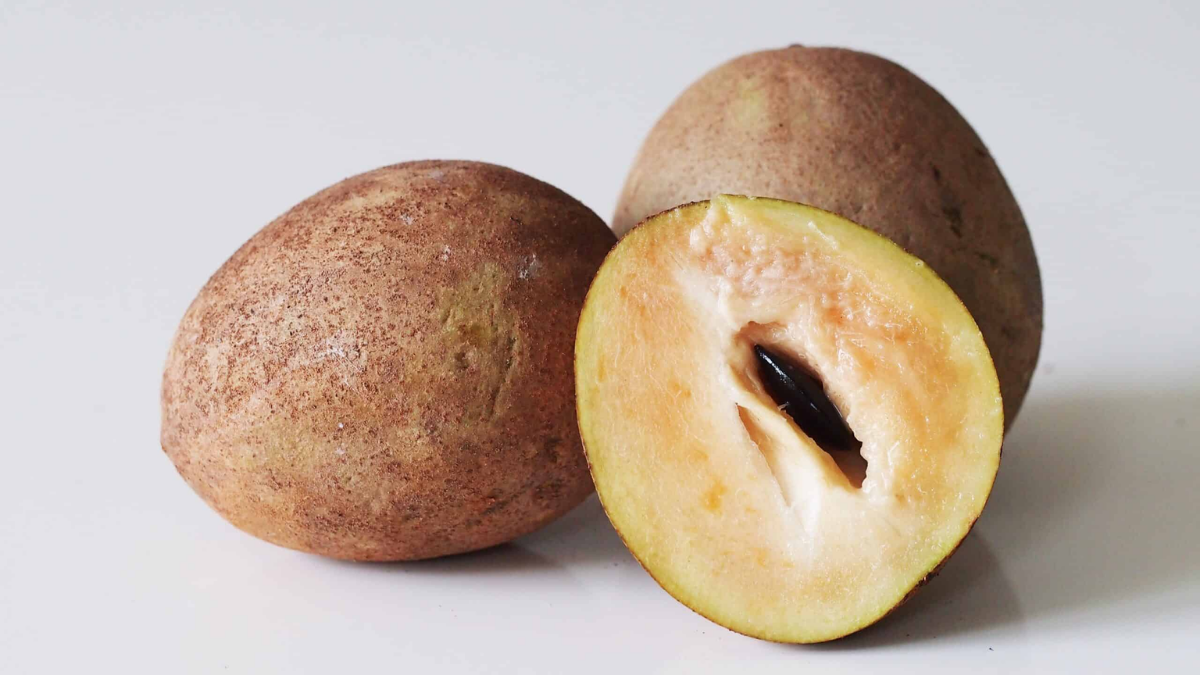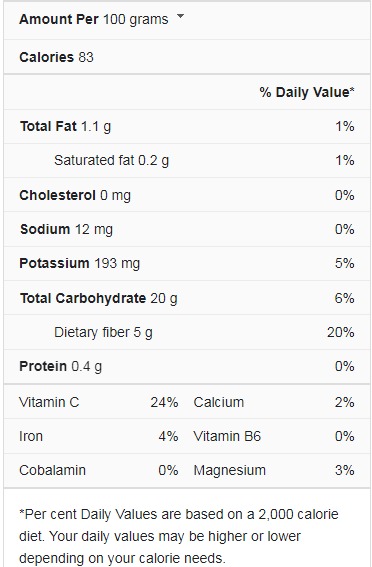Sapodilla is high in fiber and beneficial to digestive health, heart health, and weight management. Fibre, in particular, aids digestion, keeps you regular, increases feelings of fullness, and controls blood sugar and cholesterol levels. A previous study evaluated the fiber content of 37 regularly sold Thai fruits, including durian, guava, apple, Chinese pear, and star fruit, and found that sapodilla had the most fiber. Sapodillas contain 5.3–11.5 grams of fiber per 3.5-ounce (100-gram) serving, which is impressive.
Adult women under 50 are advised to ingest 25 grams of fiber each day and aim for 38 grams for men under 50. The average American consumes only 15 grams each day. Consuming sapodilla and other fiber-rich foods such as fruits, beans, and vegetables can help you meet your daily fiber goals and lower your risk of colon cancer and heart disease.
Sapodilla Nutrition Facts
Sapodilla Health Benefits
The calorie content of sapodilla is 83 calories per 100 grammes. It’s high in dietary fiber, which functions as a natural laxative by adding bulk to the stool, promoting bowel movement, and helping to protect the colon’s mucosal lining from cancer-causing toxins. This fruit is high in polyphenol compound tannin, which has astringent, anti-inflammatory, antiviral, antibacterial, and anti-parasitic properties and is commonly used to treat hemorrhoids and gastrointestinal issues.
Sapota, high in vitamins A and C, helps maintain healthy vision, fight infections, increase immunity, and keep you disease-free. It also includes significant amounts of other critical nutrients such as potassium, copper, iron, and vitamins like folate, B1, and B5, necessary for the body’s proper metabolic processes and overall well-being.
Provides Plenty of Energy
Sapodilla is a calorie-dense fruit made primarily of simple carbohydrates like fructose and sucrose that are easily digested. Because sapota is a natural source of sugar, it may rapidly refill energy levels and is an excellent snack option during strenuous sports or activities. Additionally, sapodilla is the most extraordinary fruit for youngsters and pregnant women to meet their increased energy needs while improving overall health.
Encourages Digestion
Natural plant ingredient tannins in sapota aid in neutralizing acid discharge in the intestine. The considerable volume of dietary fibers bulks up the stool, regulates bowel movement, heals constipation, and cures all other digestive issues. Apart from that, sapodilla’s antiparasitic, antiviral, anti-inflammatory, and antibacterial properties can help treat gastritis by calming the irritated gastrointestinal system.
Immune System Strengthening
Sapota, rich in vitamins A, C, polyphenols, and antioxidant substances, has an essential role in developing a robust immune system, combating harmful pollutants, and lowering disease risk. Furthermore, including sapodilla in a healthy diet protects the body from dangerous microorganisms and relieves seasonal colds and coughs.
Stress Relief
One of the most common difficulties that hurt your health is stress, and this can be considerably reduced by eating nutritious foods. Sapodilla is one such food that is high in critical nutrients, including vitamin C, which boosts the immune system and improves overall health. It also relaxes the nervous system and improves mood because it is a natural sedative.
Bones are Strengthened
If you’re over 30 and already have joint difficulties, chickoo should be part of your diet. Sapodilla contains many minerals such as calcium, phosphorus, copper, selenium, magnesium, and iron, which help build bones, minimize joint pain, and reduce the risk of osteoporosis. Copper deficiency can raise the risk of osteoporosis. Therefore cuckoo’s copper content is vital for keeping bones, connective tissue, and muscles healthy.
Cancer Prevention
Sapodilla’s antioxidants fight free radicals, reduce oxidative stress, limit tumor cell growth, and reduce the risk of numerous types of cancer. Being naturally high in vitamins A and B protects the mucus lining and reduces the incidence of lung and mouth cancers. Besides that, consuming a high-fiber diet helps maintain gut health and protects against colon cancer.
Anemia Treatment
Anemia is a prevalent health problem in women of reproductive age caused by an iron shortage. When the body cannot produce hemoglobin, the red blood cells that transport oxygen and nutrients to all cells, a condition known as anemia develops. Iron and copper-rich sapota help to improve iron levels and treat anemia.
Blood Pressure Control
Sapodilla is one of the most popular fruits for lowering blood pressure. Potassium, a crucial mineral found in chickoo, helps lower sodium levels, relax muscles, increase blood circulation, and maintain blood pressure.
Enhances vision
Sapota, which is high in Vitamin A, plays an integral part in preserving excellent vision by improving the health of the cornea, the eye’s outer layer. It’s also a part of rhodopsin, a protein that helps you see in low light and improves your vision.
Is Sapodilla Beneficial for Losing Weight?
While the fruit is healthful and assists weight loss, and has no adverse side effects when consumed in moderation, it can consume more calories than is recommended and may cause weight gain rather than weight loss. Chikoo, also known as sapota, may help you lose weight and abdominal fat, and it regulates your digestive system and protects you from irritable bowel syndrome (IBS). It also contains dietary fibers, which might help you feel fuller.
Furthermore, chiku aids in the body’s metabolism. Fiber-dense and Sapodilla are high in fiber and beneficial to digestive health, heart health, and weight management. Fibre, in particular, aids digestion, keeps you regular, increases feelings of fullness, and controls blood sugar and cholesterol levels.
What does a Sapodilla Taste Like?
Sapodilla has its distinct flavor character, making it an excellent introduction to sapote fruits. This one is adorable, with brown sugar, sweet potato, and pear notes. They have a pearly texture, and a deep molasses flavor frequently described as malty. Sapodilla is also called zopota, chikoo, sawo, and soda in different parts of the world. Strange fruit in this country, yet a popular domestic fruit worldwide.
They have a caramel flavor and can be eaten whole or peeled and sliced. The tropical fruit sapodilla has a distinct malty flavor. Fresh fruit can be consumed by rinsing, patting dry, halving, and eating the meat off the skin. After removing the central seeds, enjoy this fruit in smoothies, fruit and lettuce salads, sauces, syrups, pie, and pancake or muffin batter. Enjoy!
Is Sapodilla High in Potassium?
Sapota is a fruit that is highly recommended for lowering blood pressure. It aids in reducing sodium levels, stimulates blood circulation, and controls blood pressure because it is high in potassium. Sapodilla is a nutritious fruit containing all vital elements, such as dietary fibers, iron, calcium, antioxidants, and vitamins A, C, and B complex. When consumed in small doses, it can aid with energy, brain health, vision, and immunity.
Sapota, which is high in calcium, iron, and phosphorus, aids in enhancing and strengthening bones. Copper is required for bone, connective tissue, and muscle formation, and copper deficiency raises the risk of osteoporosis, muscle weakness, low strength, breaking, and brittle joints. Yes, because it is high in simple sugars like sucrose and fructose, sapodilla, or chikoo is high in sugar. Sugar sufferers often avoid chikoo because of its high sugar and calorie content.
Is Sapodilla Suitable for Kidney Patients?
Protects against kidney illnesses: It also protects against other kidney diseases. The seeds of the Chikoo are also beneficial to one’s health since they act as a diuretic and aid in removing kidney and bladder stones; however, because chikoo is a nutritional powerhouse, it keeps the bones strong and healthy. The fruit is high in folates, potassium, magnesium, calcium, phosphorus, and iron and can be eaten regularly to avoid additional medications later in life.
This fruit contains magnesium, which aids in the healthy functioning of our blood vessels, and potassium helps keep blood pressure in check. People with diabetes can eat any fruit as long as their sugar levels are under control. Mangoes, chikoo, and grapes have a high glycemic index and should be consumed in moderation or avoided entirely.
Sapodilla Good for a Woman?
Sapodilla is a good source of fiber, vital for digestive health, heart health, and bodyweight management. Fibre, in particular, aids in the maintenance of intestinal bacteria, keeps you regular, promotes sensations of fullness, and controls blood sugar and cholesterol levels. Please wait until the sapodillas are fully ripe before scooping the fruit from the peel and freezing it. Remove the skin and seeds and discard.
Then freeze the fruit for up to a month in an airtight container or ice cube tray. It is a superfood for pregnant women because it contains several nutrients. Vitamins, antioxidants, and minerals are also abundant. Eating the fruit in moderation will not damage you and only benefit your health. Her weight and age determine a pregnant woman’s ability to consume food.
Is Sapodilla Good for a Cold?
Cough and Cold Remedy: The Sapota fruit has been used to relieve congestion and chronic coughs in alternative medicine. It aids in the removal of mucus and phlegm from the nose tube and respiratory tract. As a result, it is an excellent treatment for colds and coughs. Yes, in fact. The chemical components present in the fruit have been shown in studies to help with congestion. They cleanse the nasal canal and respiratory tract by flushing phlegm and mucus.
Chikoo is also used to treat chronic coughs. Chickoo plant leaves provide critical minerals and plant components that have been shown to help treat mouth ulcers. The data and pitta doshas are balanced, while the Kapha dosha increases. Sapodilla’s mild, calm, and vipaka qualities are beneficial for treating gastritis and other gastrointestinal problems.
Conclusion
The evergreen tree Manilkara zapota, also known as sapodilla, is native to Mexico, the Caribbean, and Central America. It is now widely grown in many other parts of the world, including India. The tree can reach 98 feet (30 meters) and produce sapodillas, spherical or egg-shaped fruits. The fruit is known as sapodilla in North America. Still, it is also known as naseberry in the British West Indies, chicku in India, chickozapote in Mexico, sapotillier in the French West Indies, and dilly in the Bahamas. The dark, rough-skinned fruit is 2–3.5 inches (5–9 cm) in diameter and weighs 2.6–7 ounces (75–200 grams).
The flesh is yellow to light brown and has a soft to somewhat gritty texture depending on the variety. When mature, sapodillas have a sweet flavor, attributable to their high sugar content. They’re frequently consumed raw but also used in drinks and baked items. The sapodilla tree’s leaves, bark, and fruit have long been utilized to treat fever, ulcers, and arthritis in traditional medicine systems. Sapodillas have also been shown to contain various vitamins and minerals and solid plant chemicals. As a result, eating fruit can help your health in various ways.



